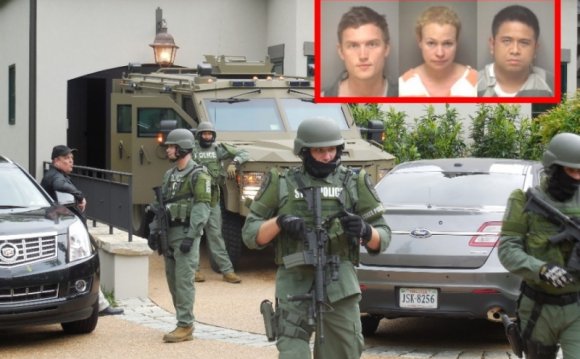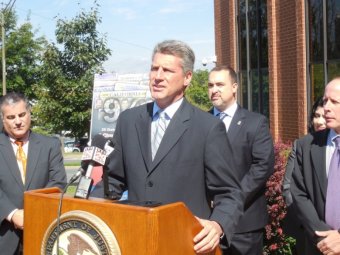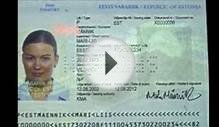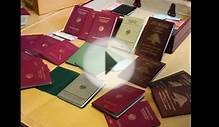
Alan Jones, Kelly McPhee, and Mark Bernardo (inset) pleaded guilty to manufacturing fake IDs at a Rugby Road residence.
photo by Lisa Provence/U.S. Marshals

U.S. Attorney Tim Heaphy says the fake IDs produced locally were so realistic, "It would be hard for me and you to tell the difference."
photo by Lisa Provence
A student with a fake ID had been turned away from a bar on the Corner when a man said, "I can help you with that." The 2010 encounter spawned what prosecutors call "a very sophisticated and very lucrative" Charlottesville-based fake ID ring, which raked in $3 million until it abruptly ended in May with a SWAT-style arrest and shut down of Rugby Road.
The three defendants in the enterprise that produced approximately 25, 000 phony licenses pleaded guilty in U.S. District Court September 4 to two felony charges that could send them away for up to 17 years and carry as much as $500, 000 in fines.
Alan McNeil Jones and Kelly Erin McPhee, both 31, and Mark Gil Bernardo, 27, entered guilty pleas to conspiracy to commit identification document fraud and aggravated identity theft, the latter of which carries a two-year mandatory sentence. They also agreed to forfeit the more than $2 million in cash found in their house and around town, including $1.3 million in a safe, $500, 000 in a safe deposit box at Wells Fargo on the Downtown Mall, and $43K in parcels from the U.S. Postal Service.
Jones was the "mastermind" of the operation, according to U.S. Attorney Tim Heaphy. In 2010 in Birmingham, Alabama, Jones' house was foreclosed upon, and he began doing research to find people approximately his age who were born in one state and died in another, says Heaphy.
One of those was Joshua Tucker. Jones obtained a birth certificate for Tucker, fabricated a social security card, UVA student ID, and a Virginia driver's license. Using the Tucker ID, in August 2011 he rented a 5, 000-square-foot house at 920 Rugby Road, paying $4, 000 a month cash in rent. The house, assessed at $1.3 million, was "on a street where UVA professors live, " says Heaphy.
Jones was a self-taught counterfeiter, and through trial and error, got better at it, says Heaphy. His Virginia driver's licenses were "really good, " and looking at a real one and a Jones-manufactured one, "You wouldn't be able to tell the difference, " says Heaphy.
From the encounter on the Corner, Jones launched a word-of-mouth business, paying commissions to UVA students who referred his product to others.
The demand for fake IDs spread, and the company, Novel Designs, was soon manufacturing driver's licenses from 17 states.
Potential customers would email a hushmail.com account, and Jones would reply with instructions for payment and the information he needed, including a jpeg photograph.
He was more sophisticated in producing the product than in handling the cash that flowed in, according to Heaphy. Initially Jones used a money transfer company called MoneyPak that had him running to pick up payments at various retail outlets in all over town. He switched and required a cash advance that was sent to a post office box in Charlottesville.
Jones enlisted his girlfriend, McPhee, to assist in the booming business.
She entered customer information into a program called ID Flow, applied hologram stickers, worked quality control and packaged the fakes for shipment in the mail. Initially, the IDs were shipped in birthday cards, described by Heaphy as an "ironic" gesture providing underage kids with a new birthday.
McPhee also opened bank accounts to handle the burgeoning cash flow, and procured the safe deposit box at Wells Fargo where she stashed half a million dollars.
The business continued to boom, with Jones using a company in Bangladesh to alter photographs from customers so that the background matched the state license. But it was the holographic material he procured from China that upped the quality level of the IDs— and created greater demand.
He met Bernardo in an online forum and recruited him to help with the business, with the goal of creating a website where customers could could upload their photos and input information themselves. In December 2012, Bernardo moved into the fake ID factory on Rugby Road, and shortly after that, he gave his brother-in-law $50K in cash to buy a 2013 Cadillac SUV.
At $75 to $100 per license, Novel Designs had revenues in excess of $3 million, according to Heaphy, and they manufactured between 20, 000 and 25, 000 IDs targeting the thirsty underage college market, according to the U.S. attorney. In the original complaint, they were accused of making 4, 000 bogus documents.
The law enforcement investigation started with a lucky break at the College of Charleston where five friends ordered fake IDs. The student picking them up dropped the envelope containing five Ohio driver's licenses, says Heaphy. Someone found the envelope, turned it in, and that led to a post office box in Charlottesville.
In court September 4, all three defendants pleaded guilty, but two of their lawyers are pointing fingers at Jones when it comes to prison sentence lengths.
"I think there will be substantial differences in culpability when it comes to sentencing, " said McPhee's attorney, Andrew Sneathern, after the hearing.
"My client didn't get involved until it was already in business two years, " says Fred Heblich, who represents Bernardo. "His role was somewhat compartmentalized. He didn't handle the cash. I woud suspect he would be considered somewhat less culpable than the other two."
Bernardo and McPhee both signed a plea agreement; Jones did not.
"In federal court, unlike in state court, you have the right to have the sentence reviewed on appeal, " says Jones' attorney, Dave Heilberg, acknowledging that his client is facing a greater sentence than his co-conspirators. "They worked for him, " says Heilberg.
The three face sentencing December 16.
After the hearing, a phalanx of law enforcement gathered in front of the federal courthouse, including the Postal Inspection Service, Homeland Security, and the Virginia State Police.
The fake IDs put "the security of our country at risk, " said Scot Rittenberg from Homeland Security, and he called using them for underage drinking a "nefarious" reason.
While the arrest of the three in May appeared to be a full military operation set to deal with a terrorist threat, so far, there's been no evidence the IDs have fallen into terrorist hands, says Heaphy. "I think they tried hard to sell to college students, " he says.
Authorities are notifying the colleges and the students who purchased Novel Designs' wares, and will ask them to send the illegal products back. And at present, says Heaphy, "I don't have the intention to prosecute college students."
RELATED VIDEO










